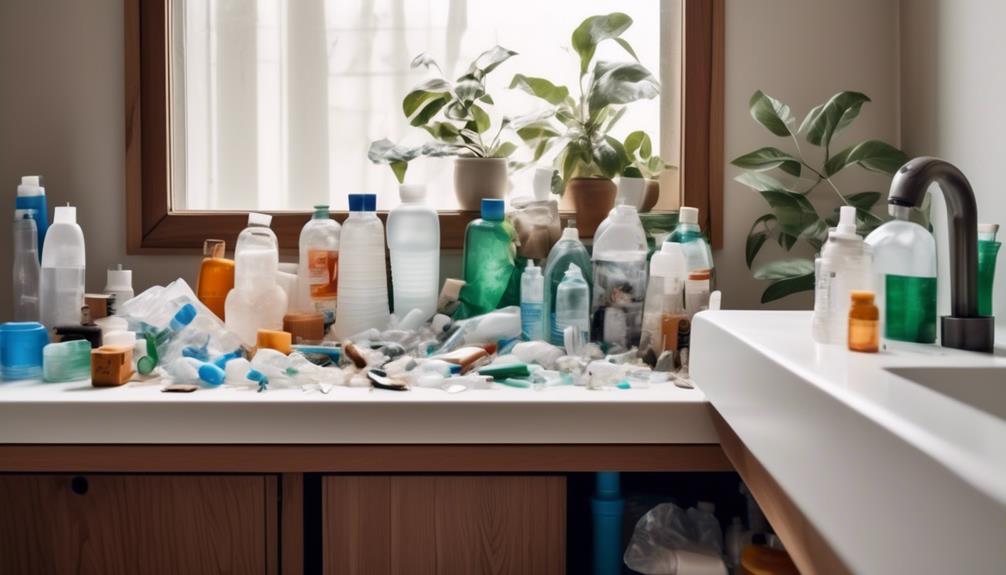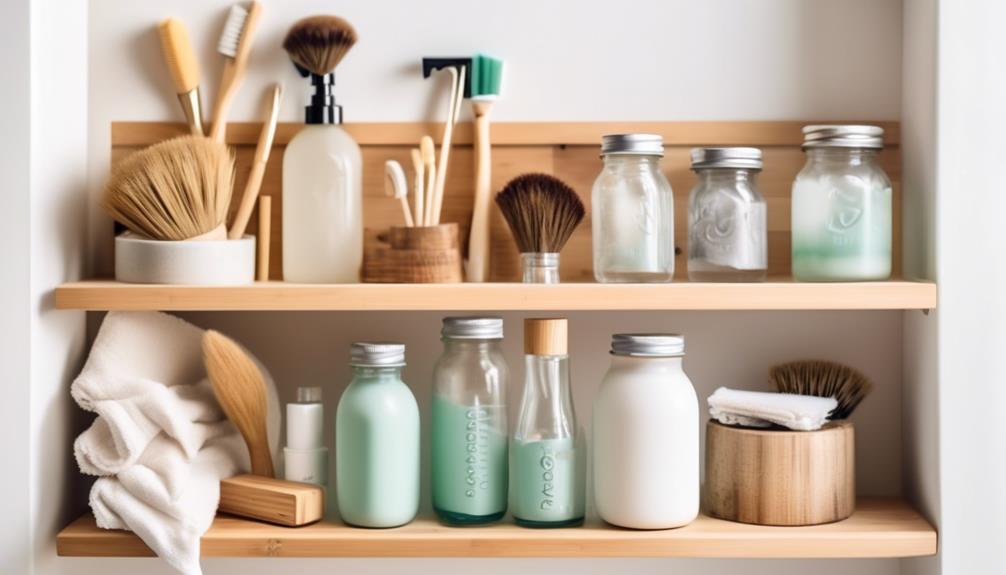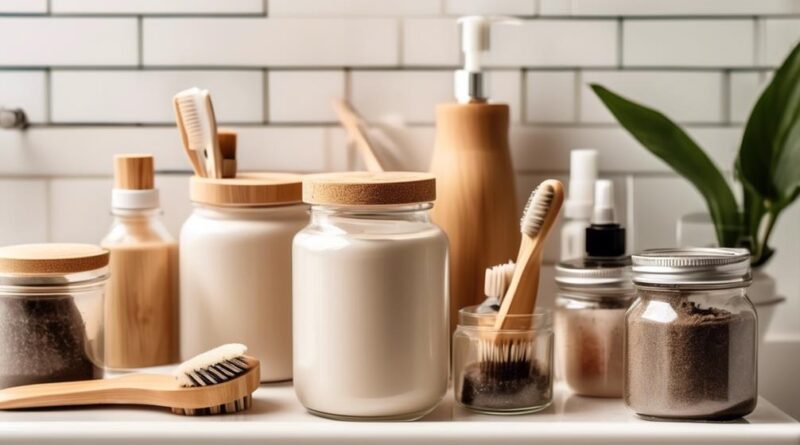Creating a Zero Waste Bathroom: A Step-by-Step Guide
Coincidentally, you may not realize how much waste your bathroom generates on a daily basis. From plastic toothpaste tubes to disposable razors, the amount of trash can quickly add up.
But fear not, creating a zero waste bathroom is entirely possible and can be achieved step by step. By making simple changes to your daily routine and the products you use, you can significantly reduce the amount of waste your bathroom produces.
So, if you're ready to minimize your environmental impact and create a more sustainable bathroom, stick around to discover practical and achievable steps to get you started on this eco-friendly journey.
Assessing Current Waste

Before beginning your journey towards a zero waste bathroom, take a moment to assess the current waste generated by your daily routines. Start by evaluating your bathroom habits to identify areas where you can make changes.
Reducing plastic and minimizing waste are essential goals in this process. Consider the products you use, such as disposable razors, plastic toothbrushes, and single-use packaging. Look for sustainable alternatives like safety razors, bamboo toothbrushes, and products with minimal or recyclable packaging.
Examine your hair care and skincare products. Opt for items with minimal packaging or those available in refillable containers to reduce plastic waste. Consider making your own products using simple, natural ingredients to minimize packaging and waste. Additionally, explore options for recycling used containers or repurposing them for other needs.
Assess your daily routines to identify potential areas for waste reduction. For instance, using washable cloths instead of disposable wipes can significantly minimize waste. Similarly, choosing reusable cotton rounds over single-use cotton pads is an effective way to reduce waste. Evaluate your water usage and consider installing water-saving fixtures to further minimize waste.
Sustainable Shower Products
Evaluate your shower products to identify sustainable alternatives that minimize plastic waste and support your zero waste bathroom goals. When it comes to sustainable hygiene and environmentally friendly bathing, there are several options to consider.
Start by replacing your traditional plastic bottles of shampoo, conditioner, and body wash with solid bar alternatives. Look for products that come in minimal or biodegradable packaging, and opt for ones made with natural ingredients to reduce the environmental impact. These bars aren't only long-lasting but also eliminate the need for plastic containers.
Consider investing in a reusable and durable shower loofah or natural sea sponge instead of disposable plastic poufs. These options aren't only better for the environment but also provide a luxurious bathing experience.
Additionally, when it comes to sustainable shower products, look for refillable options. Many companies offer refill stations for shampoos, conditioners, and body washes, allowing you to reuse your existing containers, thereby reducing plastic waste.
Another sustainable option is to switch to bamboo or compostable shower accessories, such as toothbrushes, razors, and exfoliating gloves. These products are biodegradable and reduce the amount of plastic in your bathroom.
Eco-Friendly Oral Care
Consider switching to eco-friendly oral care products such as bamboo toothbrushes and compostable floss to reduce plastic waste in your bathroom.
Bamboo toothbrushes are a sustainable alternative to traditional plastic toothbrushes. They're biodegradable and have a lower environmental impact since bamboo is a fast-growing and renewable resource. Additionally, bamboo toothbrushes often come in recyclable or compostable packaging, further reducing waste.
Compostable floss is another eco-friendly option for your oral care routine. Traditional dental floss is typically made of nylon, a type of plastic that can take hundreds of years to decompose. In contrast, compostable floss is made from biodegradable materials such as silk or plant-based fibers, which break down naturally in compost or landfill environments. By choosing compostable floss, you can minimize the amount of plastic waste generated from your oral hygiene routine.
When it comes to toothpaste, look for brands that offer products in recyclable or reusable packaging. Some companies also offer toothpaste tablets or powders that eliminate the need for plastic tubes altogether. These innovative alternatives reduce the environmental impact of traditional toothpaste packaging.
Making the switch to eco-friendly oral care products not only reduces plastic waste but also supports sustainable practices. By incorporating bamboo toothbrushes, compostable floss, and eco-friendly toothpaste options into your daily routine, you can contribute to a more environmentally friendly bathroom and a healthier planet.
Zero Waste Hair Care
Switching to a zero waste hair care routine can further reduce your environmental impact and contribute to a more sustainable bathroom. When it comes to zero waste hair care, opting for a natural shampoo is a great place to start. Look for shampoos that come in bar form or in recyclable packaging. These shampoos are often free from harsh chemicals, making them better for both your hair and the environment.
Additionally, making your own homemade conditioner can be a fun and eco-friendly alternative. You can create a nourishing conditioner using simple ingredients like apple cider vinegar, coconut oil, and essential oils. This not only reduces your plastic waste but also allows you to control what goes into your hair care products.
Another way to embrace zero waste hair care is by exploring the option of shampoo bars. These bars are long-lasting and often come in minimal or recyclable packaging, reducing the amount of plastic waste generated. They're also convenient for travel, as they aren't subject to liquid restrictions.
Moreover, consider investing in a durable and compostable hairbrush or comb to complete your zero waste hair care routine. By making these simple switches, you can significantly minimize your environmental footprint while still maintaining healthy and beautiful hair.
Plastic-Free Skin Care
When aiming for a plastic-free skin care routine, seek out products packaged in reusable or biodegradable containers to minimize environmental impact. Embracing natural alternatives can also be a game-changer in your quest for plastic-free skin care. Look for products that utilize sustainable packaging, such as glass jars, metal tins, or compostable materials.
Opting for skincare items with minimal packaging or those that come in recyclable packaging can significantly reduce your plastic waste.
In your pursuit of plastic-free skin care, consider switching to natural alternatives like organic oils, butters, and plant-based ingredients that come in eco-friendly packaging. Look for facial cleansers, moisturizers, and serums that are packaged in glass bottles or jars, as glass is 100% recyclable and can be repurposed or recycled endlessly without loss in quality. Additionally, natural skincare products often come in minimalist, sustainable packaging, further reducing their environmental impact.
When selecting plastic-free skin care products, keep an eye out for brands that prioritize sustainable packaging and offer product refills, which can help minimize waste. Some companies offer refill stations or mail-back programs for their packaging, allowing you to reuse your containers and reduce single-use plastics.
Waste-Free Menstrual Solutions
Looking for waste-free menstrual solutions that are eco-friendly and sustainable? There are several reusable period products available that not only reduce waste but also offer numerous benefits for your health and the environment. Consider making the switch to these waste-free menstrual solutions and enjoy the convenience and peace of mind they bring.
Check out these eco-friendly menstrual products:
- Menstrual Cups: These reusable silicone cups collect menstrual fluid instead of absorbing it, offering leak-free protection for up to 12 hours. They're cost-effective, long-lasting, and reduce the amount of waste generated from disposable products.
- Cloth Pads: Washable cloth pads are an excellent alternative to disposable pads, providing a comfortable and eco-friendly option. They come in various sizes and designs, offering you a sustainable and chemical-free period experience.
- Period Underwear: Designed with built-in absorbent layers, period underwear provides a leak-proof and reusable option for managing your menstrual flow. They're comfortable, easy to wash, and eliminate the need for disposable pads or tampons.
- Reusable Tampon Applicators: If you prefer using tampons, reusable applicators made from sustainable materials are an excellent choice. They're durable, easy to clean, and significantly reduce the amount of plastic waste generated by traditional applicators.
- Sea Sponges: Natural sea sponges can be used as a reusable and biodegradable alternative to tampons. They're soft, absorbent, and can be washed and reused multiple times, making them a sustainable option for managing your period flow.
Switching to these waste-free menstrual solutions not only reduces environmental impact but also provides you with cost-effective and comfortable options for managing your period. Embrace these eco-friendly alternatives and experience the benefits they offer.
Green Cleaning Supplies

Consider incorporating eco-friendly alternatives into your bathroom routine, such as using green cleaning supplies to further minimize your environmental impact. When it comes to green cleaning supplies, eco friendly detergents and natural disinfectants are excellent choices for maintaining a zero waste bathroom.
Eco friendly detergents, such as those made from plant-based ingredients, are biodegradable and free from harsh chemicals, making them safer for the environment. Look for detergents that come in recyclable or refillable packaging to reduce waste even further.
Natural disinfectants like vinegar and baking soda are effective for cleaning and disinfecting bathroom surfaces without harming the environment. These natural alternatives are non-toxic and pose no threat to water sources or wildlife. Additionally, you can use essential oils like tea tree oil, lavender, or eucalyptus to add a pleasant scent to your homemade cleaning solutions.
To minimize waste, consider purchasing cleaning supplies in bulk or opting for concentrates that can be diluted at home. This reduces the need for excess packaging and decreases the environmental impact of transportation. When disposing of old cleaning supplies, make sure to follow proper disposal guidelines to prevent harmful chemicals from entering the ecosystem.
Implementing Low-Waste Practices
To reduce waste in your bathroom, start by establishing low-waste practices that prioritize reusable and sustainable alternatives. Implementing low-waste practices can significantly reduce the environmental impact of your bathroom routines. Here are some steps to help you transition to a low-waste bathroom:
- Conduct a Waste Audit: Begin by assessing the current waste generation in your bathroom. Identify items that are frequently disposed of and explore alternative, low-waste options. This will help you understand where the most waste is produced and where changes can be made.
- Embrace Reusable Products: Opt for reusable alternatives such as cloth towels instead of paper towels, reusable cotton rounds instead of disposable ones, and refillable soap dispensers instead of single-use plastic bottles. These simple swaps can significantly reduce the amount of waste generated in your bathroom.
- Adopt a Minimalist Lifestyle: Embracing a minimalist lifestyle can help you reduce the amount of products and packaging in your bathroom. Simplify your routine by using multipurpose products and only purchasing items that you truly need, thereby minimizing waste.
- Choose Sustainable Materials: When purchasing bathroom products, prioritize items made from sustainable materials such as bamboo, glass, or metal. These materials are often more durable and can be recycled or composted at the end of their life cycle, reducing overall waste.
- DIY Personal Care Products: Consider making your own personal care products such as toothpaste, deodorant, and body scrubs. This reduces packaging waste and allows you to have full control over the ingredients used, promoting a low-waste lifestyle.
Frequently Asked Questions
Can I Compost My Used Dental Floss and Toothbrushes?
Yes, you can compost used dental floss in a commercial composting facility, but not at home. Reusing toothbrushes is a better option. Look for toothbrushes made from biodegradable materials to minimize waste.
How Can I Properly Recycle Empty Containers of Hair Products and Skincare Items?
You can properly recycle empty containers of hair products and skincare items by checking with your local recycling program for guidelines. Look for sustainable packaging made from eco-friendly materials to ensure proper disposal and contribute to the recycling process.
What Are Some Eco-Friendly Options for Disposable Razors and Shaving Cream?
To reduce waste, consider eco-friendly razor alternatives like safety razors or reusable razors with replaceable blades. Opt for sustainable shaving cream options packaged in recyclable or compostable materials. These choices help minimize environmental impact.
Are There Any Zero Waste Options for Feminine Hygiene Products That Are Also Suitable for Heavy Flow?
For heavy flow, you can explore reusable options like menstrual cups or organic cotton pads. These are eco-friendly and reduce waste. Menstrual cups are comfortable and can hold more than tampons, making them suitable for heavy flow.
What Are Some Sustainable Alternatives to Traditional Toilet Paper and Bathroom Tissue?
To reduce waste in your bathroom, consider sustainable wipes or reusable cloth wipes as alternatives to traditional toilet paper. These options are eco-friendly and can help you minimize your environmental impact.
Conclusion
So, there you have it! By following these steps and making conscious choices, you can create a zero waste bathroom.
From sustainable shower products to waste-free menstrual solutions, there are plenty of options to reduce your environmental impact.
By implementing low-waste practices and using eco-friendly products, you can make a positive impact on the planet while still enjoying your daily bathroom routine.
It's a small change that can make a big difference!
